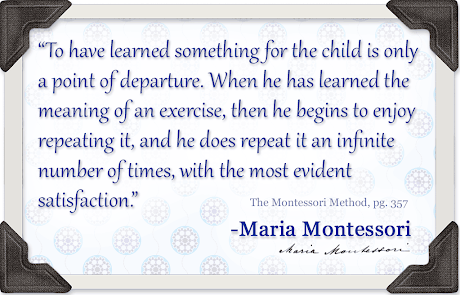
Remember the old adage, “practice makes perfect”? I am sure we can all agree on the importance of repetition in the Montessori environment. In fact, a recent search for “repetition” on the NAMC blog yielded the following results:
- It is important to remember that the need for repetition is far more important than the need for mastery.
- Repetition increases success.
- Repetition of work will allow [the children] to practice, master, and retain the material.
- Daily repetition will give much needed practice and reinforcement.
- Some children are such careful observers while other children need more repetition and hands-on practice before they master a particular concept.
- The student learns through repetition and memorization.
- Through repetition of movement, improvement is made.
- Through repetition, the Montessori child is able to differentiate between the slightest differences and variations in the world around him.
Why Repetition is So Important to the Montessori Method
Some might question, though, what repetition looks like. Repetition does not necessarily mean that the child has to engage in the same exact work over and over again. Anything that provides the child with practice of a previously learned skill, including extensions and games, is repetition. In fact, extensions and games provide higher-level repetition since they often involve synthesis, analysis, and application of previous concepts.

Repetition also comes from being in the environment. A child who observes a lesson being given is absorbing the information, however passively. Reconnecting to the original presentation helps the child see it again on a whole different level. The same can be said when a child watches another child work. These observations are important to the synthesis of the work and concept illustrated.
Finally, when children give each other lessons, this, too, is a form of repetition. It is, in fact, a higher form of repetition since the child presenting must have internalized the concept well enough to present it to another. The importance of peer teaching should not be over looked.
The practice or repetition of an activity does not stop simply because the child is able to recreate it. He must be allowed to internalize concepts through higher-level repetition through synthesis, analysis, and application.
As much as possible, NAMC’s web blog reflects the Montessori curriculum as provided in its teacher training programs. We realize and respect that Montessori schools are unique and may vary their schedules and offerings in accordance with the needs of their individual communities. We hope that our readers will find our articles useful and inspiring as a contribution to the global Montessori community.
© North American Montessori Center - originally posted in its entirety at Montessori Teacher Training on Tuesday, September 24, 2013.
© North American Montessori Center - originally posted in its entirety at Montessori Teacher Training on Tuesday, September 24, 2013.

How can you tell if a child has mastered an activity?
ReplyDeleteMy 3 year old is working on pouring, both wet and dry.
She completes the whole work cycle (rolls the mat, takes the tray to the math, works, cleans any spills, puts the material back on the shelf), but when pouring the pitchers touch almost every time.
I am not sure what to do about this, I've given the presentation many times, but still this persists.
Should I move her on to other kinds of pouring so that she will get more practice with wrist turning, or should I wait till she perfectly executes every activity?
Thanks